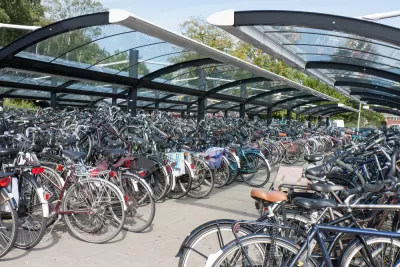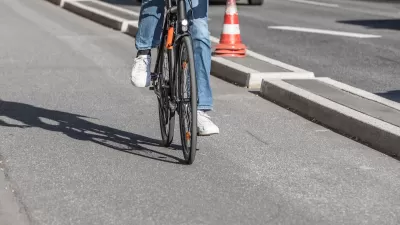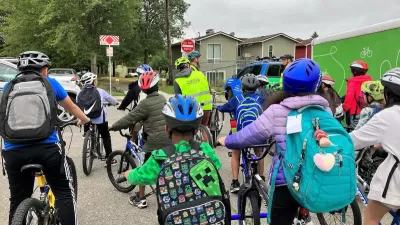According to one Canadian couple living in Holland, walkable cities and good bike infrastructure aren't just a Dutch anomaly.

Streetsblog's Kea Wilson interviews Melissa and Chris Bruntlett, a Vancouver couple who, after moving to the Netherlands, wrote a book titled Curbing Traffic: The Human Case for Fewer Cars in our Lives, "which they hope will inspire advocates to question the narrative that car-light life is a luxury reserved only for the Dutch."
The Bruntletts examine four harmful myths that discourage cycling and cycling infrastructure in the U.S. According to them, many Americans believe bikes have always played a role in Dutch life, but "the Netherlands initially embraced the automobile, until a wave of traffic-safety activism in the early ’70s and the 1973 oil embargo crisis made universal car dependence controversial and impractical." Early efforts to build cycle tracks often met with local resistance, "with some business owners even prying up the tracks in the middle of the night."
Another misconception: car-light cities are harmful for people with disabilities. Instead, Melissa says, " in a low-car city that’s designed well, we’re inherently providing streets that give people more space to move in wheelchairs, with canes, and other mobility aids, too. In that kind of space, people with disabilities aren’t just accommodated; virtually the entire public realm is open to them."
The third myth: Holland's street safety protests tipped the scales toward discouraging private cars. In fact, it was the Dutch government's 1979 Noise Abatement Act that helped force communities to cut down on car traffic.
The fourth myth explored by the Bruntletts deals with the common perception that good bike infrastructure is an entirely Dutch creation. "[T]here are communities all over the world that are doing this. You can learn from the Netherlands, or from Montreal, or Auckland, New Zealand, or Bogotá, Colombia," says Chris. "Any city can achieve this, but politicians need to put their money where their mouths are and build the people-centered places they all say they want."
FULL STORY: Four Myths About Car-Light Cities, Busted

Alabama: Trump Terminates Settlements for Black Communities Harmed By Raw Sewage
Trump deemed the landmark civil rights agreement “illegal DEI and environmental justice policy.”

Planetizen Federal Action Tracker
A weekly monitor of how Trump’s orders and actions are impacting planners and planning in America.

The 120 Year Old Tiny Home Villages That Sheltered San Francisco’s Earthquake Refugees
More than a century ago, San Francisco mobilized to house thousands of residents displaced by the 1906 earthquake. Could their strategy offer a model for the present?

In Both Crashes and Crime, Public Transportation is Far Safer than Driving
Contrary to popular assumptions, public transportation has far lower crash and crime rates than automobile travel. For safer communities, improve and encourage transit travel.

Report: Zoning Reforms Should Complement Nashville’s Ambitious Transit Plan
Without reform, restrictive zoning codes will limit the impact of the city’s planned transit expansion and could exclude some of the residents who depend on transit the most.

Judge Orders Release of Frozen IRA, IIJA Funding
The decision is a victory for environmental groups who charged that freezing funds for critical infrastructure and disaster response programs caused “real and irreparable harm” to communities.
Urban Design for Planners 1: Software Tools
This six-course series explores essential urban design concepts using open source software and equips planners with the tools they need to participate fully in the urban design process.
Planning for Universal Design
Learn the tools for implementing Universal Design in planning regulations.
Clanton & Associates, Inc.
Jessamine County Fiscal Court
Institute for Housing and Urban Development Studies (IHS)
City of Grandview
Harvard GSD Executive Education
Toledo-Lucas County Plan Commissions
Salt Lake City
NYU Wagner Graduate School of Public Service





























